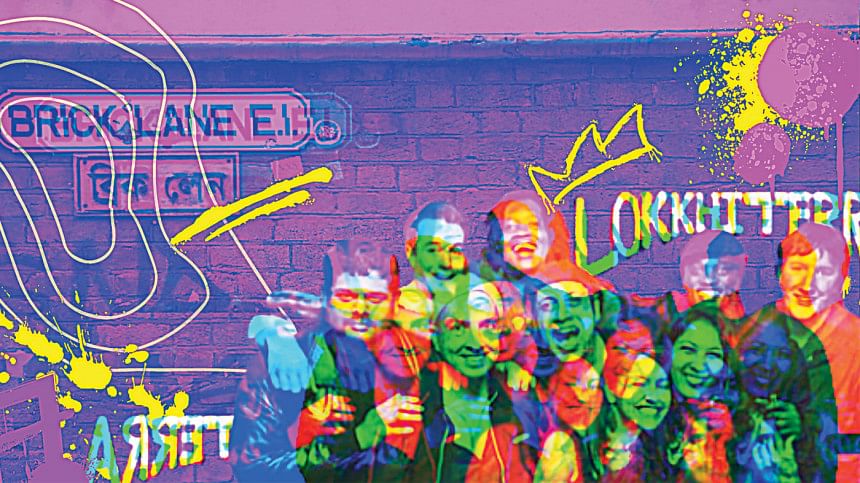On a romantic night of self

It has been more than a few weeks since I arrived in London for my Master's, and I still miss my friends, family, and acquaintances back home. Amidst the buzzing London crowd, I feel a sense of detachment followed by a yearning. It is difficult to comprehend such yearning, for it is not something material, physical, or can be touched; rather, it is for a space, a little room to wiggle in order to accomplish the slightest sense of belonging. I scour the internet in search of it, and encounter upon a show taking place in Brick Lane, the famous street in the east end of London where the Bangladeshi diaspora has seemed to claim space, or more appropriately, shall I say, is in a process of claiming space that is the continuing negotiation of what we were and what we are becoming.
The band playing is Lokkhi Terra, an Afrobeat-Cuban-Bangladeshi group, and they are playing at a Jazz Café called the 91 Living Room. Lokkhi Terra infuses Bangladeshi folk with Cuban rumba and Afrobeat, mixed with funk and Indian Classical–an apt embodiment of the multiculturality that London takes great pride in. On my way to the gig, I saw the sign 'Brick Lane' screwed to a red brick wall similar to those council flats, and below it another sign but written in Bangla. I felt drawn towards the Bangla letters, and felt a reverberation that circulated around me, tied me in a knot, and kept lightly tugging at me towards the sign. Even though in the slightest, I did feel something, and like Sara Ahmed says "In such affective economies, emotions do things, and they align individuals with communities—or bodily space with social space—through the very intensity of their attachments." It's as if these intensities preceded my emotions and aligned me to a space that felt like my own, and then I did–even though for a glimpse–felt a sense of belonging.
My quiet affective registers are that of resilience, and to not give up or give in. This unfamiliar version of me wants to create space, not just to wiggle, but to dance in a romantic night of self.
At 91 Living Room I ordered a pint and asked for halal food. I got the chicken as that was the only halal option available. Halal; something I never had to worry about, and took for granted, as I did for my space. The first song they performed was Bhromor Koiyo Giya–a Bangla song about the Hindu God Krishno and his beloved Radha. This was not my first time listening to this song, but definitely my first time hearing it with the sounds of Saxophone, in contrast to a bamboo flute, and in a Cuban Rumba musical composition. I thought to myself, "This right here perfectly embodies my current state of being. A Bangladeshi amidst Western bodies, constantly interacting even in silence, through gaze, and gesture."
Granted, I understood the Bangla words to this song. But what about everyone else not familiar with Bangla? They swayed, and listened with attention, and intent. An intent to connect, to understand, and to make space for something foreign, and not comprehensible in its totality. "Media, Multiculturalism, and the Politics of Listening" is a paper by Tanja Dreher where he insists on the muting of the inner voice, in order to listen, and allow an openness to the other. The article comprises three vignettes, and one of them about a reading of the Sufi Poet Rumi at Sydney Writers' Festival. Other than in English, the readings comprised of Farsi, Turkish and Arabic, and yet, there existed active listening. Dreher says "The performance struck me as an exercise in the politics of listening–in quiet and in contemplation and in patience and witnessing and respect and listening itself as a contribution to a beautiful and moving experience." As if in an undeliberate reincarnation, the audience in 91 Living Room availed themselves to the politics of listening. Instead of asking us, and by us, I mean every marginalised subject to "speak up", they took the responsibility upon their shoulders to listen. I could sway to the tunes of Lokkhi Terra now, as I felt a weight lift off my back.
Like Black and White, and Yin and Yang, some from the audience left with refusal in their faces and gestures. They picked up their iPhones, Mastercards', purses, and left as if staying longer would mean letting go a part of themselves. I smelt fear dispersing, like a dog in perplexity. Sara Ahmed conceptualises this fear as "The fear of passivity that is tied to the fear of emotionality, in which weakness is defined in terms of a tendency to be shaped by others." They feared softness, like a child in Freudian imagination fears castration. Their castration was not of the phallus, but a castration of their "whiteness".
At the end of the show, I picked up my iPhone, and took a selfie to send to my friends back home. I looked at it twice, as I could not recognise my own reflection. I am alone, and I am wearing a puffer, and a scarf. There are white bodies mingling in the background, while this unfamiliar version of me stares back at me. I try to listen to this version of me. Listening entails sound, and from the visual I jump ships to the aural. I clear my throat as if that would help me to listen better, to engage with the sonic frequencies of the image. It is quiet but not mute, as Tina Campt would say "Quiet is a modality that surrounds and infuses sound with impact and affect, which creates the possibility for it to register as meaningful." My quiet affective registers are that of resilience, and to not give up or give in. This unfamiliar version of me wants to create space, not just to wiggle, but to dance in a romantic night of self. I will go to university, attend lectures, eat free Hare Krishna lunch, make humane connections, and create space within the constraints of everyday life. And to borrow from Listening to Images (2017), "…both quiet and the quotidian are mobilised as everyday practices of refusal."
I was on my way home, a little light-headed from the pints, but with a sense of belonging. From the Brick Lane sign written in Bangla, to Bhromor Koiyo Giya, and to have been really listened to, I carved out a little space for myself. It's small, and I still have to sit in a squat, but I shall continue living, clearing my throat, and humming, until I can dance!
Labib Mahmud is an Adjunct Lecturer at the Department of English and Modern Languages, North South University.

 For all latest news, follow The Daily Star's Google News channel.
For all latest news, follow The Daily Star's Google News channel. 









Comments